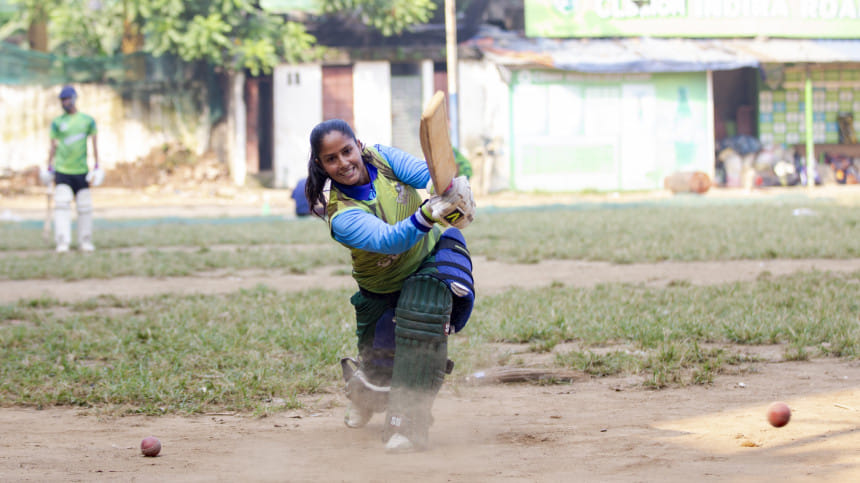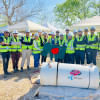What it takes to play sports while fasting

For many around the world, sports are an undeniable part of their lives. Whether it be for staying in shape, having fun, or to become an athlete, sports enthusiasm hardly ever wavers in our country. However, it is always recommended to fuel up on food and drinks before, during, and after exercising or playing sports of any kind in order to avoid health risks.
Under these circumstances, one might think that the month of Ramadan brings a screeching halt to sports for those who fast. But that is rarely the case, as a break from classes and the joyous Eid holidays fill the fields with life throughout the day.
Sheikh Hamim Siam, a second year HSC student at St. Joseph Higher Secondary School and College, never missed an opportunity to play football with his friends during Ramadan.
"Football in the afternoon was almost like a daily ritual for us," he said. "We were susceptible to getting dry throats and some fatigue, but we still played our hearts out and made sure to start late in the afternoon so we could have iftar soon afterwards."
The same goes for Rakin Omar Shaheed, 18, a student at Notre Dame College, and a former member of St. Joseph's basketball team. Despite fasting, he had practice sessions almost every day throughout Ramadan and hardly ever skipped a beat.
"Basketball has always been my passion so I sought out ways to improve my own game despite fasting," says Rakin.
Managing your health while fasting every day is a prerequisite on its own, but when sports are thrown into the everyday mix, it becomes an even more integral point. Figuring out your own capacity for exercise on an empty stomach becomes crucial to maintain your body's internal temperature and stress levels.
Nafisa Mehzabin Deeba, a first year student at North South University, has been playing basketball since her high school days, and has had ample time over the years to create a routine that fits her needs and limits.
According to Deeba, "During Ramadan, the intensity of practice sessions was slowed down a bit. Instead of running long laps, we jogged around the court, and we skipped the drills that required full court running. At the same time, we avoided full length matches or played 3vs3 on half courts."
Sarah Islam*, 21, was a martial arts practitioner throughout her high school years. During the month of Ramadan, she had to adapt her practice regime in accordance to her physical abilities. "I used to put extra emphasis on stretching and warming up before practising. An important tip we used to get was to limit the daily exercise and focus on less intensive ones so as not to burn ourselves out too quickly," she recalls.
Rakin, on the other hand, could only access his school's court during the daytime, so he used to focus less on running laps before matches while fasting, and instead focused more on the technical side of things.
"Although running was crucial to maintain our physique, it would also make you dehydrated in no time at all. Even though the body might get accustomed to the workload within the first few days of fasting, precautions were still in place. That is why I focused more on dribbling, shooting, and defending during the day and tried to put in cardio workouts later in the evening or at night," he shared.
He continued, "Another important piece of advice is to take enough breaks while practising. It is easy to get overstimulated while practising and yelling directions on an empty stomach, so resting up is a good way to avoid any dangers."
Besides practice, healthy food and water intake during sehri and iftar is also crucial for players as they are what get them through the day.
Nafisa always recommends maintaining a diet that can circumvent the effects of consuming oily food and practicing without hydration during Ramadan.
"I tried to be mindful about my protein intake since physical exertion without it would lead to pain throughout the body afterwards. At the same time, I tried to always eat a couple of dates during sehri and iftar as it replenished my energy levels quite a bit," Nafisa said.
She further advised, "Electrolyte drinks and coconut water are great ways to move away from oily food as eating too much can negatively affect the shift in diet during Ramadan as well as provide essential fuel throughout the day."
Sarah followed similar instructions as her coaches encouraged everyone to drink a lot of water before fasting.
She said, "Since martial arts are physically demanding, coupled with our country's temperature, we lose a lot of body fluids by sweating, so it is always recommended to drink water in controlled amounts after breaking the fast and before starting one."
Playing any sort of sport while fasting — be it casual or at a professional level — is no easy task, especially in our hot and humid climate. However, as long as one is sensible about the quantity of food and water they are consuming and how much they're being exposed to practice, sports are a great way to cultivate bonds with friends and indulge in the joy of Ramadan.
*The name has been changed upon request for privacy.
Ayaan immerses himself in dinosaur comics and poorly-written manga. Recommend your least favourite reads at [email protected]

 For all latest news, follow The Daily Star's Google News channel.
For all latest news, follow The Daily Star's Google News channel. 







Comments